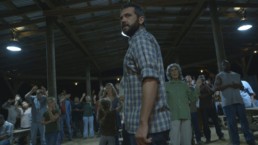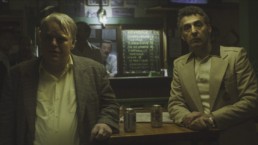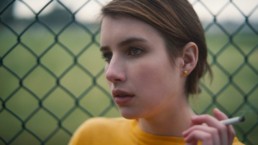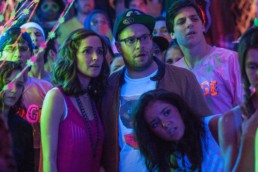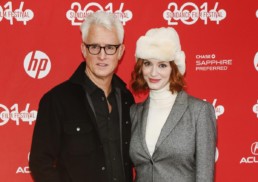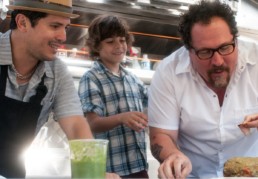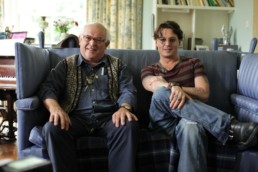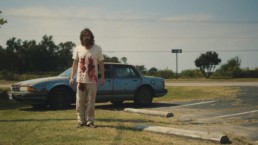Review: 'The Sacrament'
A sacrament, in Christian terms, is defined as a religious ceremony or act that is regarded as an outward and visible sign of inward and spiritual divine grace. Director Ti West takes this definition to its most extreme, in his latest film, The Sacrament.
As shown on Day 3 of AFI Fest, West (The Innkeepers) was on hand to introduce his arresting film, playing in the Midnight series of screenings, which definitely aided in providing a sort of charged energy amongst the audience while watching. That electricity of the night might have further helped how the film played, which operates on a more slow-burning pace, taking great patience until finally arriving to its intended payoffs of horror.
Staged as a documentary, a VICE video diary to be exact, we follow journalist Patrick (Kentucker Audley) as he sets out to reconnect with his estranged and once drug-addicted sister Caroline (Amy Seimitz), now living on a private-living compound in an African country. And of course, working as a videographer for VICE (of internet and blogosphere notoriety), an alternative news outlet documenting nonstandard cultural practices events, Patrick brings with him a video team comprised of reporter Sam (AJ Bowen) and videographer Jake (Joe Swanberg) to document the experience. Landing soon enough, by way of helicopter, the crew is jarringly met by armed guards, yielding automatic gunfire.
The evil that takes form in this film is one that stems from the darkest of motivations from the human condition.
The initial skepticism and hint of fear that the team feels then carries through the rest of their stay, as they are eventually, though with great hesitance, allowed to enter the private community and document the experience. Reconnecting with Caroline, with a now eerily positive energy and outlook on life, she informs Patrick and the crew of the community's efforts to attempt to remove themselves from the hypocrisies and evils of modern day living, leading the VICE team to grow even more suspicious, and wonder who is leading their new-age community. The answer, they find, is "Father" (Gene Jones), the leader of the compound, who the crew are intrigued to interview. Yet upon their meeting with Father, and with soft spoken voices of the community, they find that things are very much not as they seem, and that their outsider presence has just disrupted their way of living. From here, about halfway through the film's run time, the real payoffs start coming, and the horrors of cult mentality are fully materialized.
As West has stated, he wanted to make a film without "supernatural" elements or horrors, as his previous films have employed. And so, the evil that takes form in this film is one that stems from the darkest of motivations from the human condition. Taking inspiration from the real-life Jonestown Massacre of 1978, a horrific cult event which is remembered for its fateful "drinking of the Kool-Aid," Sacrament plays almost identically in plot. The real magic here is in its effective set up; we believe in these characters (a good choice to ground the characters as VICE journalists, a modern day magazine that could conceivably cover such an unorthodox story), and with its effective handheld camerawork. Though its detractors might spark from not-enough "happenings," or "story" to the film, its overall execution of what was intended to be captured and told is a harrowing first-person experience of the power, manipulation, and sacrifice that is found in faith, and fate. With its eventual upcoming distribution by Magnet Films, this film should be viewed and appreciated for its harrowing real-life depiction of evil, unlike any film I've seen before.
https://www.youtube.com/watch?v=QqDZFMArLjI
Review: 'God's Pocket'
There's a certain charm to what first-time feature film director John Slattery (Mad Men's Roger Sterling) brings to this darkly comical inner-city drama, God's Pocket. Adapted from the novel of the same name, the film tells the story of the fragmented Scarpato couple losing their son Leon (Caleb Landry Jones) in a construction "accident." Though it features a truly all-star acting class, bringing veteran performances to try and really wrangle that specific tone down, the story manages to feel consistently untamed, and unsure of what it wants to leave its audiences with.
"God's Pocket" refers to the imaginary New York suburban city of which all the residents are like family- more specifically, like your equal parts overly-loving yet just as volatile family members whose unquestioned love stems from the years of shared familial history surviving in the Pocket. Slattery here gets to choose all of the tools and colors to paint the picture of what one off-the-wall life event might be like in this unkempt hole of a neighborhood, along with imagining all of the players to breathe life into the story.
The dry hi-jinks and bonkers provide the humor that, lensed through this serious subject matter, give the film its black comedy packaging.
God's Pocket features an incredible group of veteran film actors, giving the film a boost in prestige and intrigue right off the bat, and whose collective talents and work give end to being the film's biggest draw. Manning the wheel of this readily-stocked indie, and whose involvement may end up being, in the not too distant future, the film's most memorable trivia that audiences and film buffs remember as being "one of his last performances," is the late, great, Philip Seymour Hoffman, in a wholly reined in role as the gambler/drunk step-father of Leon, Mickey Scarpato. Christina Hendricks, Slattery's cable-TV buddy, assumes the role of dutiful home keeper and loving mother Jeanie Scarpato, whose breathy character gives the actress a fine role to play.
Also along for the ride are the incredible Richard Jenkins, having his own fun as a drunken newspaper writer Richard Shellburn, whose arrival and coverage of the death in the Pocket stirs the pot even further. Throw in some side supporting characters with a penchant for illegal activities and gambling, like John Turturro's Arthur 'Bird' Capezio, and you get a flavorful smattering of a day in the life of this tale of people, through self-induced problems and high-jinks fashion, continue to just carry on.
The dry hi-jinks and bonkers provide the humor that, lensed through the serious subject matter, give the film its black comedy packaging. Though these moments here stem from honest storytelling, like when Leon's funeral money makes its way to being gambled, or when his body is transported by way of a meat packing car, there is still a confused tone to how we the audience feel we should internalize them. Are they comic moments in the tragedy that is this dark opera of lower-class American life? Or is the story a humorous account of life's most bizarre happenings, rooted in classic familial woes? It's in these muddled curiosities that leave the film hanging in the balance- perhaps not perfect, but still loved and accepted by the faithful community that makes it up.
https://www.youtube.com/watch?v=eMTdOwyrWzo
Review: 'Palo Alto'
Growing up never looked as cool as it does in the new James Franco starrer, Palo Alto. Which is a large reason for why the film feels less of a relatable young teen drama and more of a fashion film of tragically beautiful youngsters smoking cigarettes and getting into trouble. Where recent coming-of-age indies like The Perks of Being a Wallflower and The Spectacular Now succeeded for committing themselves to getting into the minds of these tormented and confused teens, relying on stylistic choices only to further that world story, the job here feels a little less personal, and like its characters, a little too cool for school.
Adapted from the James Franco-penned novel of the same name, a collection of autobiographical short stories about the multihyphenate's childhood growing up in the Californian back-town, this softly lit, pastel-hued film stretches out a full narrative following three rebellious high schoolers, as they mainly shuffle from one house party to the next. Lending the film her star power in the leading role is Emma Roberts, offering her moody shyness as April, the class virgin/school soccer player who draws the attention from both her close friend Teddy (Jack Kilmer, son of Val*) and her soccer coach, Mr. B (Franco) (a plot that may sound familiar from recent tabloids of Mr. Franco's conversation with an underage Instagram user).
The job here feels a little less personal, and like its characters, a little too cool for school.
Accompanying April are her guy pals, Teddy and Fred (Nat Wolff), equally rebellious friends who drunk drive and plow down trees with a chainsaw. The vices and behaviors that the threesome share (a dynamic not unlike Wallflower, with two friends crushing on each other while the third, eccentric one, spins his wheels) speak to the reality of how these kids go about searching for and getting their kicks. So although an honest representation of their worlds, their unaffected and detached attitudes deflate whatever it is that the film is trying to say about kids and their partying.
Making her feature film debut is yet another Coppola, this time, Gia (niece of Sofia and granddaughter of Francis Ford, for those keeping score at home). And here, the familial relationship makes sense: the cinematography and all around mood begs itself to look something similar to The Virgin Suicides. While the director is able to infiltrate these moments of young love and secrecy and maintain a small-scale intimacy to the whole thing, in the end, there isn't enough point of view for us to pull any statement from it. If the moral of the story is that young teens are non-impressed with the dullness and tragedy of life itself, then the tone poem movie gets it just right. Unfortunately, that non-impress extends itself into the audience, as we are left only to spectate as our young heroes wander aimlessly throughout the film, lost and confused, with the overall movie following in similar fashion.
*This may be the most Epic way of introducing a person that I have yet typed.
https://www.youtube.com/watch?v=sTqMUu1iTIo
Review: 'Neighbors'
Out of control, glow in the dark party scenes? Check. Excessive psychedelic drug use? Check. Penis jokes? Check (in fact, this box is definitely checked off, thanks to both a certain yard sale sequence and a baby's finding of a latex item). In these respects, this comedy hits all of its low-brow marks and gets the passing grade as an entertaining frat movie for this generation's college-goers. But Neighbors, the new comedy directed by Nicholas Stoller (Get Him To The Greek), goes even further beyond the traditional wild frat partying cliché to make its mark, and impressively so. By enrolling Seth Rogen as the uncool newly husband and parent next-door, along with Zac Efron in a choice role that flaunts his most "bro-iest" of sides, the comedy makes for a laugh-out-loud time that is sure to bring those young tank-topped males running and hollering to the door.
Neighbors, also starring Rose Byrne, is the frat-comedy hangout movie that gets its yucks (comedically and disgustingly) by forcing its undergrads to confront their most formidable of opponents: grown ups. Though the "grown ups" in question here are hardly ones you'd call mature. When new parents/homeowners Mac (Rogen) and Kelly (Byrne) Radner, along with their newly infant daughter, move into a nice suburban home with dreams of starting an honest family life, they quickly find that plan disrupted by their new neighbors: keg-yielding fraternity members with a party mentality set to "self-destruct," led by a machismo-soaked and muscle milked Teddy Sanders (Efron).
After Mac and Kelly, worrying for the new environment of Skrillex-blasted music that they have to raise their daughter in, attempt a peace offering with the fraternity that goes south quick, the ensuing runtime is a series of one-ups and revenge pranks, each camp determined to get the other to leave. As winning a formula as it is, director Stoller manages to keep a level head above the college humor of it all, allowing real story to drive the manic trade-offs. And although no audience member will be going into it or even hoping for "real story," it's certainly the invisible engine operating behind the camera that makes the movie a worthwhile outing.
Efron, returning to the screen in a new, less Disney-fied role, is a welcomed casting choice, and perhaps the movie's secret weapon.
Formerly titled Townies, and then Bad Neighbors, the movie's fun certainly boils down to the winning chemistry shared between its cast, particularly that of Rogen and Efron. And while it might have been easy (or even initially conceived) to pit Rogen against some generic evil young meathead for the lumpy stoner to shine brighter against, the dynamic settles into something a little more real, and a little more satisfying. It's much more of a welcomed return on investment to see both sides' reasons for declaring war. For Mac and Kelly, nervous first-time parents who find themselves longing for their younger years, and Sigma Fi Psi president Teddy, whose party on M.O. hides his insecurities of living a shallow life, everyone finds themselves fighting out of their deepest desires. But let's not get bogged down by semantics: this is all achieved through dance-offs, exploding hidden airbags, and the film's grossest staging of Kelly's overly-inflated mammaries requiring a do-it-yourself milk pumping.
Efron, returning to the screen in a new, less Disney-fied role, is a welcomed casting choice, and perhaps the movie's secret weapon. The young leading man, here as the equivalent of the bully in The Karate Kid, gets to show off not only his six-packed body, but also a more vulnerable and human side, showing hurt when Rogen breaks his first "bro" promise and when Sigma Fi Co-president Pete (Dave Franco) reveals that he might not be as invested in the fraternity lifestyle as much as he is. The allowing of Efron's Teddy to show his hurt and insecurities gives the actor a worthwhile role and expands his range to impressive places.
Neighbors further impresses with its pulse on the college-kid party scene, with nearly every scene comprised of bass-bumping EDM and thirty drunk extras filling the frame. Though for all of its eye candy and scene filling props, the movie still feels like it was green-lit as a lower budgeted expense. It gets a slick treatment, but there's no big studio making sure that this will be the Hangover of its time. But even still, and as every college student knows, there are still creative ways to stretch your dollar, which usually end up making for some of the most fun stories to look back on.
https://www.youtube.com/watch?v=KrAf5ALLxGI
John Slattery and Christina Hendricks on 'God's Pocket'
There are just some actors whose charisma and presence are so strong and unique, that it's no wonder as to how they've found their place and success in the world of acting. Two of these people, I had the great fortune to sit down with, which also provided a wholly unique and unexpected experience for me, the reporter. As I waited for our God's Pocket stars to roll in to the roundtable room, I thought to myself, "I think I'm actually nervous?" Or at the very least, filled to the brim with anticipation. Which was shortly followed by flooded relief, as the film's writer/director John Slattery entered the room, with the movie star-esque Christina Hendricks tailing just behind. Settling in, I couldn't help but feel that right in front of me, were Roger and Joan, of Mad Men fame. Their looks, so closely tied to their TV characters' (John, the Silver Fox, wore his hair and sideburns a bit longer, and Christina, with her singular red hair and wry smiles), put me both in and out of the interview experience (I was at both times an entertainment reporter in the twenty first century, as well as a budding Ad Man at a creative meeting in the 60's). Yet as we discussed their newest project, I only grew more aware of their talent as filmmakers and actors. And while I'll still inevitably watch and see them as their iconic 60's swinging selves in their future projects, it won't be without recognizing their talents and commitments to that whole world of acting, of which they've solidified their place. We begin:
WHEN DID YOU SHOOT THE FILM?
John Slattery: We shot it in the summer, June and July of last year.
HOW DID PHILIP SEYMOUR HOFFMAN LOOK AT THAT TIME?
JS: He looked like Mickey Scarpato, who is the center of the movie. He looked fantastic.
SO YOU HAD NO IDEA...
JS: He came in and did his job, and went home.
WHAT WAS THE EXCITING PART, FOR YOU, OF DIRECTING HIM? HE'S SUCH A FIERCE ACTOR, SO FOR YOU TO GET A CHANCE TO HELP HIM FIND THAT CHARACTER AND SHAPE THAT CHARACTER...
JS: Yeah, that was the fun part. Putting it together, and realizing that he liked it enough to want to do it in the first place...the fact that I had the good fortune to have the opportunity, and all that involved, which is, as you said, putting it together, deciding, "What should I look like? Why does this guy stay in this community where people are telling him he's an outsider? And what's this relationship like with my wife? And all the questions that you hope someone will ask you in trying to put a character together that you're going to then shoot. I mean, I couldn't feel luckier. And the finished product, I think, shows the complication emotionally and the vulnerability, and everything that he has. All that emotional and intellectual intelligence, combined with the technical wherewithal that that person, that actor had, is on that screen. So I feel very lucky.
CHRISTINA, YOUR LOOK IN THE MOVIE IS SUCH A DIFFERENT PHYSICAL COMPOSURE THEN WHAT WE'RE USED TO ON TV. WAS IT TOUGH OR EASY TO GET INTO THE MOLD OF IT?
CS: You know it's funny, when I read the script, I had a picture of Jeanie in my head-
JS: You sent me a picture of what the picture in your head was.
CS: Yeah I did. I sent you a picture of sort of, the idea of hair and make up feeling like the time period, and John was like,"That's kind of what I was thinking too." So we saw eye to eye on that. And John liked the idea that it was gonna be a very different look from the project that we'd been working on together, since it was going to be another project together, it's kind of nice to mix it up.
The costuming was very specific and kind of bizarre. Like, I'm in a weird terry cloth dress for three quarters of the movie that we kind of fell in love with and thought it was just strange enough and the kind of thing that you just throw on in your house. And yeah, I thought it was great, I thought those things represented the character very well.
AT THIS STAGE, BOTH OF YOUR PROFESSIONAL CAREERS ARE VERY MUCH INTERTWINED. DO YOU REMEMBER THE FIRST TIME THAT YOU MET EACH OTHER?
CS: We were wondering earlier, I mean, we must have met at the table read...we don't remember specifically. Cause I said, "Oh, remember, we all went out for dinner afterwards?" And he said, "I don't think I was at that dinner?"
JS: I don't think I was. I was doing a play, I think I was doing Rabbit Hole on Broadway, and I don't think I went to the read-through.
CS: Maybe that.
JS: I think it closed like a couple of days before...
CS: I remember our first day of work together.
JS: Yeah, I remember the first day we worked together, it was day one. We were in an office, and you were making that speech to a wall, you did a long walk through the bull pen, and then you did that thing with Peggy with, you know, go home, take a paper bag, put it over your head, cut the eyes out, now look at yourself objectively. And then Jon Hamm and I walk in at the end of it, and I remembered, you know, a lot of the day was spent on that scene.
CS: I mean, it's interesting, because it sort of established that day, a relationship between Roger and Joan, there's a line where they walk in as I'm talking to Peggy and I say, "Good morning Mr. Draper," and then I think I said, "Roger...". And I did it very flirtatiously, not knowing any future story line, but Matt (Weiner, Mad Men) said at the end of the day, "Oh, if this show goes, Joan and Roger will have a little something," and I was like, "Yeah!"
You would never know that (Christina Hendricks) had gotten through the whole day and she goes, "God I thought I was gonna have a heart attack." -John Slattery
AND YOU GUYS HAVE WORKED TOGETHER, NOT JUST AS ACTORS, BUT AS ACTOR AND DIRECTOR.
JS: Yeah.
DID YOU LEARN ANYTHING KIND OF FUN OR SURPRISING IN THIS PROJECT THAT YOU HADN'T PICKED UP ON FROM EACH OTHER BEFORE?
JS: You know, I don't know...I'll tell you one thing that I remember, was that Christina was claiming to have been nervous during some scene, and I thought, "You know, it doesn't show at all." And then Phil had sent me a text saying that he had always been an admirer of John Turturro, he did a week on the movie, and then when it was finished, Phil was remarking about how nervous he was working with John. And Richard Jenkins was telling me how nervous he was at the anticipation of working with Christina, who he was such a fan of. And none of these people showed it at all! You would never know that she had gotten through the whole day and she goes, "God I thought I was gonna have a heart attack,"-
CS: I thought I was going to throw up!
JS: And not even like, you know, I'm a pretty good, I know what to look for, and you couldn't tell at all. And I thought, "Well, that's acting I suppose."
CS: Survival instincts is what that is!
JS: Controlling your nerves, your know, you're pretending to be someone else, you're pretending to be someone who's not nervous. And I was, not surprised by it, but sort of astonished by it.
I HAVE TO COMMEND YOU FOR GIVING YOUR MOTHER-IN-LAW (JOYCE VAN PATTEN) SUCH A GREAT, JUICY, LITTLE ROLE-
JS: How 'bout that?
WAS THAT THE FIRST TIME THAT YOU HAD WORKED TOGETHER?
JS: Uhhh. Yeah!
WAS IT WEIRD TO DIRECT YOUR MOTHER-IN-LAW IN SUCH A CRAZY SCENE?
JS: [Laughs]. No, it wasn't. She was, you know, she knew it, she knew what was called upon.
CS: She was amazing.
JS: There was one technical scene, which, I don't want to give away what happens in the scene, but there was a lot of technical, there were a lot of things that could've gone wrong. And she's so ridiculously professional, she would mark it out, mark it out, talk about it, mark it out...and then in one take we got this really difficult set up. But in general, I mean,she's been acting a long time, and it shows.
She fell in with John and Phil in those scenes, and immediately had this, what looked like, lifelong history with John Turturro, and Phil, and how they were always hugging and kissing each other in the scene. So it made sense for the film that he (Mickey) gravitates towards those two people, who are the two people who look like they care about him genuinely the most. But yeah, that's Joyce. She just jumped in and did her thing.
CHRISTINA, WHAT WAS YOUR EXPERIENCE LIKE WORKING WITH PHIL? OBVIOUSLY AN ACTOR'S ACTOR, IN THOSE SCENES WITH HIM, WHAT WAS YOUR BIG TAKWAY?
CS: Just a real warmth, and a real sense of humor, on and off camera. A very giving actor, you know, obviously someone who's listening, and watching in such a way that you just drop into the scene and you just are immediately...a very similar feeling that I have when I work with John on Mad Men. As an actor, you're constantly striving to find these real moments, these moments where you actually feel like that just happened to you, and that's the best you can feel, that's the best you can do, and I always feel like that when I work with John. And I felt like that with Phil, and Richard Jenkins. Just about as much as you could ask for. It was a gift to work with Phil, and I was probably watching his every move, trying to take away some of his magic. Just being on set with him and watching him work, hopefully, I think you just sort of gain knowledge from him.
THE END OF 'MAD MEN,' HOW DO YOU FEEL ABOUT IT, AND HOW DO THE PRODUCERS ENSURE THAT NOBODY LEAKS SECRETS OF IT BEFORE ANYONE'S READY?
CS: They ensure secrecy by extreme threats. [Laughter]
JS: Kidnap one of your kids. [Laughter].
CS: You know, I think it's a testament to how much the people involved in the show respect the show. People have come and gone over seasons, there's some people who've moved on to other jobs, different things, and they even kept the secrets all along. You could say, "I'm not on the show anymore so it doesn't matter to me," but people really do respect it, and they know that that's exciting for the audience. So for us involved in it, it's sort of an easy thing for us to do. But I've been very impressed with people who have come and gone throughout the years, that they've been so respectful.
And how do I feel about it ending? I'm overwhelmed with all sorts of feelings about it. The most is sadness, and pride. I'll walk away from this feeling very very proud, and very possessive of Joan and that experience. But I'll hold it very close to me.
Review: 'Chef'
Chef, director Jon Favreau's (Iron Man) latest film in which he also assumes screenwriter and lead actor credits, is a purely enjoyable film that should delight audiences of all kinds. Taking a break from directing the Marvel blockbuster franchise, Favreau returns with an intimate family comedy about a chef, Carl Casper (Favreau), a struggling divorcee who finds himself juggling a fledgling cooking career along with his barely-there relationship with admiring son Percy (Emjay Anthony) and loving ex-wife Inez (Sofía Vergara). The result of all these ingredients, handled in a loose yet free and fun directorial style, makes Favreau’s film a successful and uniquely alive one.
Favreau, conceiving an original screenplay here, returns to the big screen in confident stride to tell this low-budget independent movie. His natural warmth and humor as a person comes through in full and charming spades, as he crafts a story that self-runs off of its own good spirits and nature. This story about a scatterbrained yet passionate and talented head chef who struggles to recognize Percy’s admirations for his largely absent self, along with the good intentions wished by Inez, rewards audiences with genuine and honest emotional returns. In setting up this fast and loose crowd-pleaser, the film retains a playfulness and spontaneity that keeps audiences happy to be along for the ride, literally, as Casper takes Percy with him when he shifts gears, leaving a restrictive restaurant residency for a self-owning Cuban food truck business that he embarks on.
Chef uses its fast and loose shooting style to achieve a real vitality, which is paralleled with the spicy soul food that Casper comes around to realize, timed with his newfound love for his family, gives him the most satisfaction in life.
Even if the story seems easy to figure out, it dresses itself up with a number of fun elements, including a running storyline of Casper’s new taking to social media (the many tweets and pictures animated and floating above the actors’ heads add a freshness and spark), along with a smattering of A-list Hollywood talent to cameo, including Dustin Hoffman as Casper’s controlling boss Riva, John Leguizamo as Casper’s quick-witted bud and fellow chef Martin, Scarlett Johansson as Casper’s quietly tattooed receptionist friend Molly, and Robert Downey Jr. as Inez’s brash and loony ex-husband Marvin- all of whom give their best favors to the director, delivering rich supporting performances to keep the party fresh.
And of course, no movie about people cooking food would be complete about the review of the food itself. Which is also what, funnily enough, serves as the main driving storyline- that of heralded food critic Ramsey Michel (Oliver Platt) bestowing a less than favorable review upon Casper’s food, which spurns the livid chef to hastily take to Twitter for the first time, calling out the critic and creating a social media firestorm which leads to consequences that force him to confront and reassess his life’s choices. This theme, of dealing with negative reception, along with reconnecting with family, are deeply personal dealings that one might assume were not unintentionally put into the movie by the writer/director/actor to comment on his own life’s work.
In fact, the similarities between the professions of both the chef and film director are seen as highly entwined here. High pressure and highly detailed work, employing a team to create that vision, all dealt with in a highly consuming manner that can sometimes fail to appreciate family, are but some of the shared drawbacks from both gigs. Which is why the movie scores; it’s heartfelt, honest, and entertaining. Chef uses its fast and loose shooting style to achieve a real vitality, which is paralleled with the spicy soul food that Casper comes around to realize, timed with his newfound love for his family, gives him the most satisfaction in life.
https://www.youtube.com/watch?v=wgFws3AoIUY
Review: 'For No Good Reason'
You've definitely seen his work- now meet the man responsible for some of the most iconic caricatures and cartoons that helped define a generation at its most turbulent of time. Famed British artist Ralph Steadman, the man whose work and creative partnership with Gonzo journalist Hunter S. Thompson showcased his darkly perverse lensing of late 60's politics and culture, gets the documentary treatment here in For No Good Reason. Director Charlie Paul, along with the film's narrator and longtime Steadman friend/ally Johnny Depp, help tell this visionary's story of creating art that spoke to both the political unrest of the times as well as his own dark desires.
The film maintains a steady story of which to learn about this amazing artist.
Part interview of Depp with Steadman in his England-side studio, part biographical documentary of Steadman's upbringing and partnership with Thompson and beyond, the film maintains a steady story of which to learn about this amazing artist. Combine that with the dazzling black and white sprawled images and artwork, animated so as to give the cartoons an entire new life, the story is one that audiences should go to seek out, for all the right reasons.
https://www.youtube.com/watch?v=QABS2MG8UOA
Review: 'Blue Ruin'
Coming off of its buzzy premiere and run from this year's Cannes Film Festival, Blue Ruin is making its U.S. debut at the 2013 AFI Film Festival, playing in the American Independent section of the festival.
The film's director, Jeremy Saulnier (Murder Party), is also credited with writing and cinematography, which resonates in the film's tightly woven and focused vision.
Ruin tells the story of sadly Dwight (cast perfectly in Macon Blair), seen at first as inconsequential and homeless, until he learns that the man convicted of his parents' slaying has just been released from prison, shifting him immediately into fourth gear for plans of claiming personal justice. What spurns is a revenge tale of feuding families, spun together with its slow-burning tone, intelligently devised stakes, healthy doses of relieving humor, and low-budget film-making resourcefulness.
Ruin, as stated by its director, drew influence from No Country For Old Men, noticeable in its mostly deadpan tone, and similarly strung as a procedural thriller.
Set in the director's Virginian hometown, Saulnier accomplishes the difficult task of creating an expansive world to set the familial drama in. As writer and cinematographer, the production benefits from its elaborate camerawork and changing of setups, making the camera feel like an active player in this odd-ball shoot-em-up. Ruin, as stated by its director, drew influence from No Country For Old Men, noticeable in its mostly deadpan tone, and similarly strung as a procedural thriller. Though where Country succeeded by the Coen Bros.' pure cinematic power, able to elicit emotions of fear or suspense by inferring, or subtext alone, Ruin falls-just-this-side-of-short-of drawing the audience into its self-imposed sense of downward spiral hopelessness. Yet it is to the film's utmost credit that it still fills every frame with aesthetically driven imagery (the shades of blue, whether of the jalopy Dwight drives, blue shadows off the television screen, or blue skies of the final act's storm, are prevalent throughout).
Further, and very refreshingly, tension-filled moments that might typically play to an explosive tipping point are deflated with perfectly executed moments of humor. Upon an emotional moment shared by Dwight and his estranged sister Sam (Amy Hargreaves) in a diner, an arrestingly tense moment pops by an interrupting stranger's asking for their table's ketchup. Like this scene, the film is an entertaining series of side steps, capped with moments of appropriate gross-outs and laughs, making for much more than an enjoyable festival submission. With its upcoming widespread release and distribution from The Weinstein Company, Ruin should find success for the director, star, and film, as a further presence of strength in the voice of modern-day American independent film.
https://www.youtube.com/watch?v=N9z47Ji0qIk

